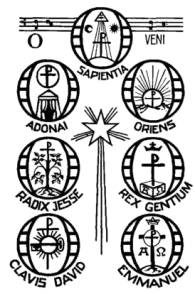 Today we begin the final days of Advent, which bring with them the beautiful O Antiphons.
Today we begin the final days of Advent, which bring with them the beautiful O Antiphons.
Years ago I made a page about these antiphons. I must update the last couple days, which I will soon.
The O Antiphons developed during the Church’s very first centuries. The writer Boethius (+525) mentions them. By the 8th century they were in use in Rome. There are seven of these special antiphons, and their texts spring from the Old Testament Hebrew Scriptures, the Prophetic and Wisdom Books. They are found in the Liturgy of the Hours or older Roman Breviary, which clerics, religious, consecrated virgins, and others use for daily prayer.
The O Antiphons are short prayers sung before and after the Magnificat, the great prayer of Mary in Luke 1:46-55 when coming visit to Elizabeth her cousin the Virgin praised God for His favor wondrous deeds. The Magnificat is sung during Vespers, evening prayer. The O Antiphons begin on 17 December, seven days before the Vigil of Christmas (24 December). The seventh and last antiphon is sung at Vespers on 23 December. They are called the “O Antiphons” because they all begin with the letter-word “O”: they address Jesus by one of His Old Testament titles. They are fervent prayers asking Our Lord to come to us.
Advent is about the many ways in which the Lord comes. He came historically at Bethlehem in the fullness of time. In the liturgical year he comes to us sacramentally. He will come again at the end of the world as Judge of the living and the dead. Christ comes to us also in the two-fold consecration of the Body and Blood of Christ by the priest at Holy Mass and, in a special way in a good Holy Communion. He comes in the person of the priest, who is alter Christus, another Christ. He comes in the words of Holy Scripture. He also comes in the person of our neighbor, especially those who are in need of the spiritual and corporal works of mercy.
During Advent, John the Baptist has been reminding us in the liturgy to “make straight His paths”. When we come to the Lord in death, or He comes to us in His Second Coming, He will make straight the path whether we have during our earthly lives done our best to straighten it ahead of time or not. Let us now, while we may, make straight the paths by which Christ Jesus comes.
Here are two additional notes about these O Antiphons.
The first is not apparent in English, but it can be seen clearly in the official language of the Roman Catholic Church: Latin. The Latin versions of each of the titles of the Messiah are: Sapientia (Wisdom), Adonai (Lord), Radix (Root), Clavis (Key), Oriens (Dawn), Rex (King), and Emmanuel (Emmanuel). Take the first letters of each of the titles, starting with the last and working back to the first. You spell: EROCRAS or “ero cras… I will be (there) tomorrow”.
The song “O Come, O Come, Emmanuel” is simply a reworking of the seven O Antiphons. When you sing it, you are joining yourself to a vast throng of Christians stretching back across centuries and spanning the whole of the earth who prayed as all Christians do, “Come, Lord Jesus!” (Rev 22:20)


































Thank you! I am so happy to finally understand this.
Father, my friend and I are in a disagreement over what to call the days leading up to Christmas. I would call them the Octave before Christmas, since there are only seven O Antiphons. But he thinks it is the Christmas Novena, nine days. Do you have any information that might help us sort this out?
In Latin America it’s tradition to do a Christmas novena leading up to Christmas. I never did this growing up so I don’t know precisely what it entails. I believe there is a celebratory aspect to it in addition to the prayers. I also think that people take turns hosting the novena on each night. It has nothing to do with the O Antiphons as far as I know. It’s still practiced among the immigrant community but as with many things from the old country the practice dies out with succeeding generations. Also it requires a huge time commitment, something that life in the USA often doesn’t give. The Christmas novena started last night. Perhaps it’s this tradition that gatorchant’s friend is recalling.
I was just listening to the Seven Magnificat Antiphons composed by Arvo Part. He is one of my favorite composers, and the antiphons are beautiful. If I am not mistaken, they are in German. I hold Arvo Part’s work in high regard, so hopefully you will give it a shot Father!
http://www.youtube.com/watch?v=kIVD6DkOHAg
http://www.youtube.com/watch?v=oy7MCmAVawo
I second Joseph’s recommendation of Pärt’s version of the O Antiphons, and I thank him for the reminder. I’ll arise from my keyboard and find my CD of them.
@gatorchant – “my friend and I are in a disagreement over what to call the days leading up to Christmas”
Sapientiatide (after the first of the O Antiphons)
http://www.breviary.net/propseason/advent/sapientia/propseasonsap.htm
Thank you for posting this and I hope you finish posting the others daily.
Yes, thank you Father. His Church is so rich in the traditions she provides for us. I feel so fortunate to be a member.